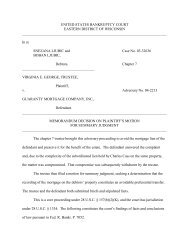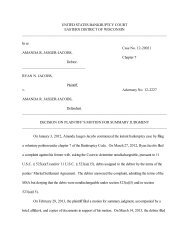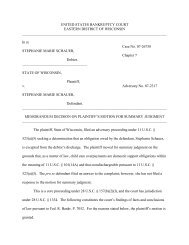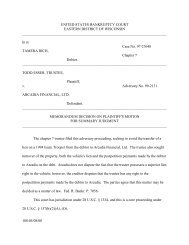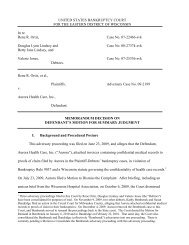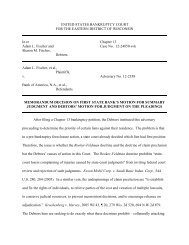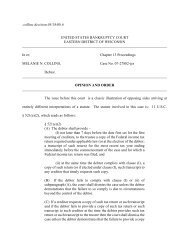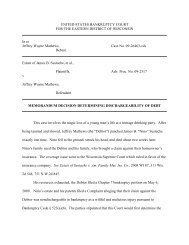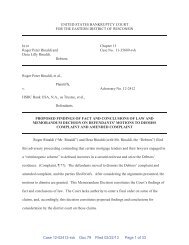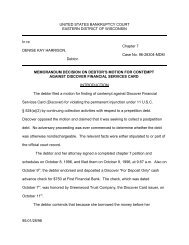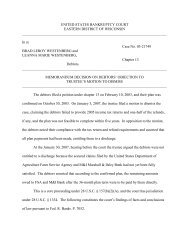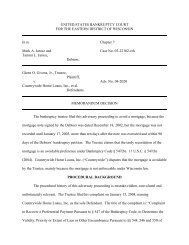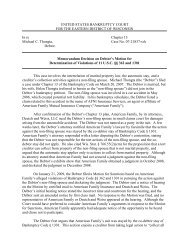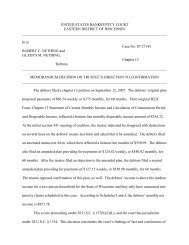In re Thomas & Laura Von Eiff, Case No. 99-29495, Christiansen ...
In re Thomas & Laura Von Eiff, Case No. 99-29495, Christiansen ...
In re Thomas & Laura Von Eiff, Case No. 99-29495, Christiansen ...
You also want an ePaper? Increase the reach of your titles
YUMPU automatically turns print PDFs into web optimized ePapers that Google loves.
[A]ll monies paid to any prime contractor or subcontractor by any owner for<br />
improvements, constitute a trust fund only in the hands of the prime contractor or<br />
subcontractor to the amount of all claims due or to become due or owing from the prime<br />
contractor or subcontractor for labor and materials used for the improvements, until all<br />
the claims have been paid, and shall not be a trust fund in the hands of any other person.<br />
The use of any such monies by any prime contractor or subcontractor for any other<br />
purpose until all claims, except those which a<strong>re</strong> the subject of a bona fide dispute and<br />
then only to the extent of the amount actually in dispute, have been paid in full or<br />
proportionally in cases of a deficiency, is theft by the prime contractor or subcontractor of<br />
monies so misappropriated and is punishable under s. 943.20.<br />
Section 779.02(5), Wis. Stats. The statute <strong>re</strong>sults in a cor<strong>re</strong>sponding civil action for parties<br />
damaged by its violation. See, e.g., <strong>Thomas</strong>, 729 F.2d 502; Capen Wholesale, <strong>In</strong>c. v. Probst, 180<br />
Wis. 2d 354, 509 N.W.2d 120 (Ct. App. 1<strong>99</strong>3).<br />
This court is satisfied that a fiduciary <strong>re</strong>lationship existed between the prime contractor,<br />
Mr. <strong>Von</strong> <strong>Eiff</strong>, and the material supplier, <strong>Christiansen</strong>, by virtue of § 779.02(5), Wis. Stats.<br />
Whether the supplier of materials took part in the actual construction (which it may have - the<br />
<strong>re</strong>cord is not clear) or me<strong>re</strong>ly delive<strong>re</strong>d materials to the site, an entity who adds value to <strong>re</strong>al<br />
estate that is paid for by the owner is an intended beneficiary of the statute. The statute protects<br />
suppliers of both labor and materials provided to the owner by a prime contractor, as <strong>Von</strong> <strong>Eiff</strong><br />
was he<strong>re</strong>, or by a subcontractor, and the debtor’s interp<strong>re</strong>tation splits a hair that is not<br />
grammatically supported by the <strong>re</strong>asonable interp<strong>re</strong>tation of the words or meaning of the statute.<br />
Mr. <strong>Von</strong> <strong>Eiff</strong> made cash payments to labo<strong>re</strong>rs on the job, but he claims that he could not<br />
pay his material supplier because he had insufficient funds for the project. He was, however,<br />
able to make other "company" payments to parties other than material suppliers or subcontractors<br />
during that same time period. Checks drawn on <strong>Von</strong> <strong>Eiff</strong> Construction Company's account<br />
during the <strong>re</strong>levant period (April through July 1<strong>99</strong>8) included the following: Tim's Auto Parts,<br />
120:2/8/01 4



